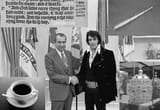Search Results
!!/7cMIiSCHvi/lit/24536636#24548469
7/14/2025, 7:09:36 AM
Untitled
by Momus
>>24527051
Okay, “Momus,” Mr. Shortest-Ever /lwc/ Submission, let’s riddle you out…
>Momus — (Greek mythology) The personification of satire and mockery.
>https://en.wiktionary.org/wiki/Momus#English
There are two characters; one gives the other a colonoscopy with a telescope, a lyrical religious vision ensues, and then the story ends.
Let’s meet our characters:
First character is “Pope Clement the 8th”
>Pope Clement VIII; 24 February 1536 – 3 March 1605
>https://en.wikipedia.org/wiki/Pope_Clement_VIII
Second character is “William Kemp”
>William Kempe; c. 1560 – c. 1603; English actor and dancer who specialised in comic roles; Shakespeare’s Falstaff
>https://en.wikipedia.org/wiki/William_Kempe
These historical figures were contemporaries, and their occupations were opposite to one another—C8 was serious, somber, and religious; Willy K was comical, crowd-pleasing, and secular.
Basically, your story is the Elvis-meets-Nixon of the Early Modern Period.
>Theme Requirement: Wrestling with the tension of opposites.
Yay, theme requirement fulfilled! (And character requirement, since you kinda have to be some flavor of religiously-fanatical to be pope.)
Now, the story opens with Willy K peering through the fateful telescope, declaring
>“Can’t see him.”
But who is “him?” Well, we can eliminate God from the list of possibilities, as He is picky about His capitalized pronouns, after all, but, then again, maybe this is a diminution of “Him” to “him,” done out of Willy K’s irreverence towards Christianity, and—
Wow, so I just found out that the Bible Willy K would have been reading would have been the Bishops’ Bible, and the text does not include “Reverential Capitalization” (see top left of picrel).
So maybe they are looking for God!
I would like to point out an anachronism…
The inciting incident of your piece—the telescope sodomy—would have been impossible to perform, since at this duo’s latest possible date together—around 1603, right before Kempe dies—telescopes had not been invented yet:
>the earliest known telescope, which appeared in 1608
>https://en.wikipedia.org/wiki/History_of_the_telescope
But, hey, maybe one night on the farther right-hand side of “c. 1603,” there was a prototype that only really famous folks could access, or something.
And, as emergent technologies go, it was pretty great how you painted the telescope as an opaque, unintuitive contraption in their hands:
>“Are you pointing it in the right direction?”
Then the ’scope gets shoved and the revelation takes place—I guess WK does see God?—and then says to the pope
>“No cap”
And all the “papabile” “defrock.”
Willy is so cool that I’m assuming he’s already talking Zoomer-speak in c. 1603—proclaiming the authenticity of “Ultimate reality in its totality”—but the painfully literal Catholic crowd takes him literally and bathetically disrobes.
Till August!
by Momus
>>24527051
Okay, “Momus,” Mr. Shortest-Ever /lwc/ Submission, let’s riddle you out…
>Momus — (Greek mythology) The personification of satire and mockery.
>https://en.wiktionary.org/wiki/Momus#English
There are two characters; one gives the other a colonoscopy with a telescope, a lyrical religious vision ensues, and then the story ends.
Let’s meet our characters:
First character is “Pope Clement the 8th”
>Pope Clement VIII; 24 February 1536 – 3 March 1605
>https://en.wikipedia.org/wiki/Pope_Clement_VIII
Second character is “William Kemp”
>William Kempe; c. 1560 – c. 1603; English actor and dancer who specialised in comic roles; Shakespeare’s Falstaff
>https://en.wikipedia.org/wiki/William_Kempe
These historical figures were contemporaries, and their occupations were opposite to one another—C8 was serious, somber, and religious; Willy K was comical, crowd-pleasing, and secular.
Basically, your story is the Elvis-meets-Nixon of the Early Modern Period.
>Theme Requirement: Wrestling with the tension of opposites.
Yay, theme requirement fulfilled! (And character requirement, since you kinda have to be some flavor of religiously-fanatical to be pope.)
Now, the story opens with Willy K peering through the fateful telescope, declaring
>“Can’t see him.”
But who is “him?” Well, we can eliminate God from the list of possibilities, as He is picky about His capitalized pronouns, after all, but, then again, maybe this is a diminution of “Him” to “him,” done out of Willy K’s irreverence towards Christianity, and—
Wow, so I just found out that the Bible Willy K would have been reading would have been the Bishops’ Bible, and the text does not include “Reverential Capitalization” (see top left of picrel).
So maybe they are looking for God!
I would like to point out an anachronism…
The inciting incident of your piece—the telescope sodomy—would have been impossible to perform, since at this duo’s latest possible date together—around 1603, right before Kempe dies—telescopes had not been invented yet:
>the earliest known telescope, which appeared in 1608
>https://en.wikipedia.org/wiki/History_of_the_telescope
But, hey, maybe one night on the farther right-hand side of “c. 1603,” there was a prototype that only really famous folks could access, or something.
And, as emergent technologies go, it was pretty great how you painted the telescope as an opaque, unintuitive contraption in their hands:
>“Are you pointing it in the right direction?”
Then the ’scope gets shoved and the revelation takes place—I guess WK does see God?—and then says to the pope
>“No cap”
And all the “papabile” “defrock.”
Willy is so cool that I’m assuming he’s already talking Zoomer-speak in c. 1603—proclaiming the authenticity of “Ultimate reality in its totality”—but the painfully literal Catholic crowd takes him literally and bathetically disrobes.
Till August!
Page 1
